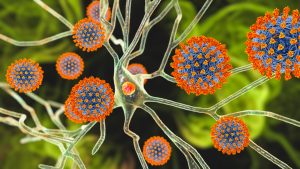Long-term loss of smell and taste for 27 million COVID patients worldwide
Published: 28 Jul 2022

Conceptual 3D illustration of coronaviruses and neurons causing smell and taste disorders, a complication from COVID-19. Copyright:drmicrobe,123RF
In a study published by the BMJ (British Medical Journal), one of the world’s leading medical journals, a team of Singapore and international researchers from the United Kingdom and United States of America found that about 5% of the global population may develop long term issues with their sense of smell or taste after coming down with COVID-19.
The loss of taste and smell are common reported symptoms in COVID-19 patients, with up to 50% of patients globally experiencing them, but little is known about their clinical course or how many patients develop persistent dysfunction.
There are more than 550 million confirmed COVID-19 cases to date (as of July 2022). Of which, about 15 million and 12 million patients may experience long term smell and taste dysfunction respectively, according to the study.
The loss of smell and taste can have an impact on quality of life and general health and this could contribute to the rising burden of long COVID, a long-term side effect from their infection.
Based on 18 observational studies involving 3,699 patients from 12 countries, the research team utilised a mathematical technique known as cure modelling to estimate self-reported rates of smell and taste recovery and identify key factors associated with the duration and likelihood of recovery. They found that 5.6% and 4.4% of patients might develop long lasting self-reported smell and taste dysfunction post-COVID-19, respectively—about 15 million and 12 million patients worldwide as of July 2022. At 30 days after initial infection, only 74% and 79% of patients had their sense of smell and taste restored respectively.
Women were less likely to recover their sense of smell and taste, and patients with greater initial severity of dysfunction and those with nasal congestion were less likely to recover their sense of smell. While most patients are expected to recover their sense of smell or taste within the first three months, a group of patients might develop long lasting dysfunction that requires timely identification, personalised treatment, and long-term follow-up.
These findings are likely to be of substantial relevance to general doctors and otolaryngologists in the counselling of patients with smell and taste disorders post-COVID-19, the team concluded.
The international collaborative research team is led by Associate Professor Toh Song Tar, Head, Department of Otorhinolaryngology–Head & Neck Surgery, Singapore General Hospital (SGH) and Benjamin Tan Kye Jyn, House Officer, National University Hospital, and also comprises current and newly graduated medical students from the Yong Loo Lin School of Medicine, National University of Singapore (NUS Medicine). They are Han Ruobing, House Officer, KK Women’s and Children’s Hospital, Joseph Zhao, House Officer, Khoo Teck Puat Hospital, Nicole Tan Kye Wen, Year 4 Medical Student, NUS Medicine, Emrick Quah Sen Hui, House Officer, Ng Teng Fong General Hospital and Claire Tan Jing-Wen, Year 5 Medical Student, NUS Medicine. Ear, Nose and Throat specialists from Singapore, UK and USA are also part of the research team.
The paper can be accessed here.
Read more in the press release here.
News Coverage

